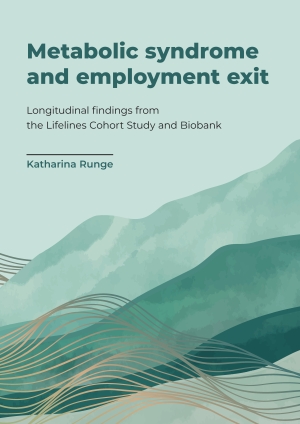Monday 21 October 2024 Katharina Runge successfully defended her doctoral thesis entitled ‘Metabolic syndrome and employment exit: Longitudinal findings from the Lifelines Cohort Study and Biobank‘ at the University of Groningen.
As many Western countries, the Netherlands face a new demographic reality of an aging working population. To ensure the sustainability of the Dutch welfare state and pension system, statutory retirement ages are increasing. However, many workers still exit employment prematurely, often due to chronic diseases. A potential risk factor for premature employment exit is the growing global metabolic syndrome (MetS) epidemic. MetS is an early-stage, modifiable risk factor for chronic cardio-metabolic diseases and consists of a combination of hypertension, abdominal obesity and/or unfavorable blood values.
This dissertation investigates the relationship between MetS and employment exit among middle-aged and older Dutch workers. Longitudinal data from the Lifelines Cohort Study and Biobank suggest that MetS is both a risk factor for and outcome of premature employment exit. Further, workers in lower skilled and blue-collar occupations were at highest risk for MetS incidence, partly due to a clustering of unhealthy behaviors among these occupations.
This research was supported by the Research Fund of the Royal Netherlands Academy of Arts and Sciences (KNAW-Institutes). The studies in this thesis were jointly conducted at the Netherlands Interdisciplinary Demographic Institute (NIDI) and within the Health in Context Research Institute of the University Medical Center Groningen (UMCG) and under auspices of the research program Public Health Research (PHR).
For more information on the PhD defence see the University of Groningen website.

